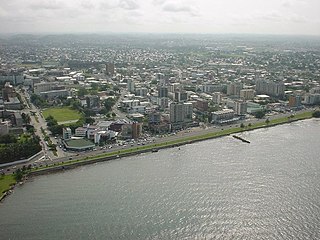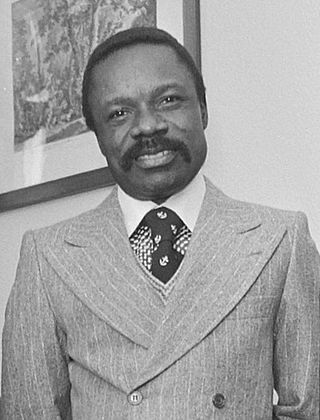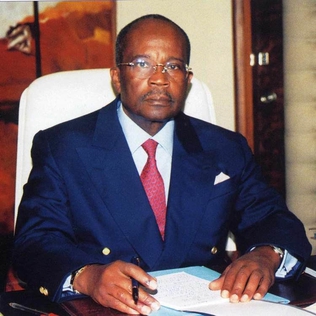| |||||
| Decades: | |||||
|---|---|---|---|---|---|
| See also: | |||||
Events in the year 1995 in Gabon .
| |||||
| Decades: | |||||
|---|---|---|---|---|---|
| See also: | |||||
Events in the year 1995 in Gabon .

Gabon, officially the Gabonese Republic, is a country on the Atlantic coast of Central Africa, on the equator, bordered by Equatorial Guinea to the northwest, Cameroon to the north, the Republic of the Congo on the east and south, and the Gulf of Guinea to the west. It has an area of 270,000 square kilometres (100,000 sq mi) and a population of 2.3 million people. There are coastal plains, mountains, and a savanna in the east. Libreville is the country's capital and largest city.
Little is known of the history of Gabon before European contact. Bantu migrants settled the area beginning in the 14th century. Portuguese explorers and traders arrived in the area in the late 15th century. The coast subsequently became a centre of the transatlantic slave trade with European slave traders arriving to the region in the 16th century. In 1839 and 1841, France established a protectorate over the coast. In 1849, captives released from a captured slave ship founded Libreville. In 1862–1887, France expanded its control including the interior of the state, and took full sovereignty. In 1910 Gabon became part of French Equatorial Africa and in 1960, Gabon became independent.

Libreville is the capital and largest city of Gabon, located on the Gabon Estuary. Libreville occupies 65 square kilometres (25 sq mi) of the northwestern province of Estuaire. Libreville is also a port on the Gabon Estuary, near the Gulf of Guinea. As of the 2013 census, its population was 703,904.

The president of Gabon is the head of state of Gabon. A total of three people have served as president since the post was formed in 1960.

Omar Bongo Ondimba was a Gabonese politician who was the second president of Gabon for almost 42 years, from 1967 until his death in 2009. Bongo was promoted to key positions as a young official under Gabon's first President Léon M'ba in the 1960s, before being elected vice-president in his own right in 1966. In 1967, he succeeded M'ba to become the country's second president, upon the latter's death.

The Gabonese Democratic Party is a political party in Gabon. It was the dominant political party in Gabonese politics from 1961 until 2023, when it was deposed in a coup d'état against President Ali Bongo Ondimba. It was also the sole legal party between 1968 and 1990.

Jean Ping is a Gabonese diplomat and politician who served as Chair of the African Union Commission from 2008 to 2012. Born to a Chinese father and Gabonese mother, he is the first individual of Chinese descent to lead the executive branch of the African Union.

The National Woodcutters Rally–Rally for Gabon is a political party in Gabon.

Elections in Gabon take place within the framework of a presidential multi-party democracy with the Gabonese Democratic Party, in power since independence, as the dominant party. The President and National Assembly are directly elected, whilst the Senate is indirectly elected.

Ali Bongo Ondimba, also known as Ali Bongo and Ali Ben Bongo, is a Gabonese former politician who was the third president of Gabon from 2009 to 2023. He is a member of the Gabonese Democratic Party. He is the son of Omar Bongo, who was president of Gabon from 1967 until his death in 2009. During his father's presidency, he was Minister of Foreign Affairs from 1989 to 1991, represented Bongoville as a deputy in the National Assembly from 1991 to 1999, and was the Minister of Defense from 1999 to 2009. After his father's death, he won the 2009 Gabonese presidential election. He was reelected in 2016, in elections marred by numerous irregularities, arrests, human rights violations, and post-election protests and violence.

Casimir Marie Ange Oyé-Mba was a Gabonese politician. After serving as Governor of the Bank of Central African States (BEAC) from 1978 to 1990, Oyé-Mba was Prime Minister of Gabon from 3 May 1990 to 2 November 1994. Subsequently, he remained in the government as Minister of State for Foreign Affairs from 1994 to 1999, Minister of State for Planning from 1999 to 2007, and Minister of State for Mines and Oil from 2007 to 2009.

Gabon – United States relations are bilateral relations between Gabon and the United States.

The following outline is provided as an overview and topical guide to Gabon :

Franco-Gabonese relations are the current and historical relations between France and Gabon. Both nations are members of the Organisation internationale de la Francophonie and the United Nations.

Presidential elections were held in Gabon on 6 December 1998. Incumbent President Omar Bongo, in power since 1967, sought a seven-year term against five other candidates. It was Gabon's second multi-party presidential election and, despite low turnout and polling problems, Bongo won the election with 66.88% of the vote.

Presidential elections were held in Gabon on 5 December 1993, the first time more than one candidate had contested a presidential election in the country. Incumbent President Omar Bongo, in power since 1967, sought a five-year term against twelve other candidates. According to official results Bongo won in the first round with 51.2% of the vote. However, the main opposition leader, Paul Mba Abessole, alleged fraud, claimed victory, and threatened to form a rival government. Riots in 1994 practically brought the country to a standstill until Bongo agreed to attend a peace conference with opposition groups in September 1994, in which a coalition government was formed until the 1996 parliamentary election, which Bongo's Gabonese Democratic Party won by a landslide.

Franck Emmanuel Issoze-Ngondet was a Gabonese diplomat and politician who served as Prime Minister of Gabon from 2016 to 2019.
Elections to the French National Assembly were held in Gabon and Moyen Congo as part of the wider French elections election on 10 November 1946.

Presidential elections were held in Gabon on 27 August 2016. Incumbent President Ali Bongo Ondimba ran for re-election and was challenged by former Minister of Foreign Affairs Jean Ping. On 31 August, the electoral commission proclaimed Bongo's re-election with a margin of less than two percent. Large protests broke out in the capital Libreville after the results were announced. Irregularities such as Haut-Ogoou showing that 99.9% of the electorate had voted and Bongo had received 95.5% of the votes led to observers questioning the conduct of the election.
Events in the year 1998 in Gabon.